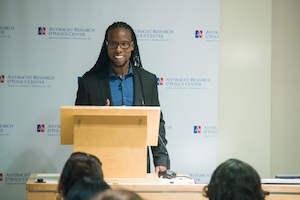A Vision for AU’s New Antiracist Research and Policy Center
Professor Ibram Kendi share plans for first-of-its-kind Center.

Professor Ibram Kendi shares his vision for AU's Antiracism Research and Policy Center. Photo by Jeff Watts.
Last week, American University's Ibram X. Kendi presented his vision for the much-anticipated, first-of-its-kind Antiracist Research and Policy Center at AU. He spoke to an overflow crowd of students, faculty, and community members.
"Tonight, I want to plant the seed I plan to grow—with your help—into a critical force for change," Kendi said.
Kendi, a New York Times bestselling author and one of the nation's leading scholars of racism, joined American University in August as the founding director of AU's Antiracist Research and Policy Center. He is a professor of history and international relations in the College of Arts and Sciences and School of International Service.
"The College joins with the School of International Service in being exceptionally proud to have brought Dr. Kendi to AU," said Peter Starr, dean of the College of Arts and Sciences. "We look forward to seeing his vision for the Center become reality."
The Antiracist Research and Policy Center comes at a major moment in the life of our nation, said Christine BN Chin, interim dean of the School of International Service. "This Center affirms the educational, research, policy, administrative, and demographic imperatives of crossing borders," she said in opening remarks. "All of these are aimed at addressing a significant barrier—racial inequality and inequity—that plague the human condition in this country and elsewhere in the world."
Discriminatory Policies Produce Racist Ideas
Kendi's latest book, Stamped from the Beginning: The Definitive History of Racist Ideas in America, won the National Book Award for nonfiction in 2016. The book's central and distinctive finding is that racist policies produce racist ideas—not the other way around, as many people were taught to believe. This finding forms Kendi's vision for the Antiracist Research and Policy Center: a central hub to identify inequalities, determine the discriminatory policies behind these inequalities, and ultimately change these policies in the United States and across the world.
"When we come to grips with the fact that the Earth is round, the climate is changing, and the racial groups are equal—are equivalent in all their imperfect humanity, in all their apparent bodily and cultural differences, in all their genetic sameness, I think we'll be a lot better off," Kendi said. "We must come to grips with the reality of racial equality—with the reality that policy change is the driving force of racial change."
Justice, Economy, Education, Environment, Health, and Politics
The Center will support six teams focused six key policy areas: justice, economy, education, environment, health, and politics.
The six teams will consist of scholars from American University and around the world, as well as journalists, policy experts, and advocates. "We want to bring these people together on teams where each person can do what he or she does best," Kendi said, "as part of an intellectual assembly line where problems of inequity become policy solutions, and where solutions become change."
AU faculty members will lead the teams, assisted by students and community coordinators. Each team will choose a major project—a specific inequality they want to pursue—and each team member will outline his or her role in the project. They will dedicate the fall semester to researching discriminatory policies and envisioning corrective policies, and the spring semester will be dedicated to promoting policy change.
Early Initiatives
The Center's first major educational initiative is building and maintaining the world's largest virtual and user-friendly library of data on racial inequality. "This library will allow scholars and journalists and policymakers, and activists—and you and I—to have all sorts of data on inequality at our fingertips, all in one spot," said Kendi, who encouraged students in the audience to volunteer to work on the library.
Kendi also announced the Center's second initiative, a series of debates on race, "bringing together thinkers from two sides of the intellectual equation to debate the most serious and critical racial issues of the day." Kendi plans on partnering with AU's Kennedy Political Union, the highly respected student-funded speakers bureau at American University.
At the same time, Kendi said, both undergrad and graduate students will have many opportunities to get involved in the Center's work. They can volunteer to assist one of the six teams. They can take specialized courses designed and taught by professors leading the teams. And they may conduct research for one of these real-life projects.
Through the work of the Center, American University will offer a series of specialized courses on inequality and discrimination, taught by some of the most dynamic in-house and outside researchers in the world, according to Kendi. "These courses would provide a new model for the interplay of research, policy, and curriculum," he said.
The Future
Kendi acknowledges that the Antiracist Research and Policy Center has its work cut out for it. But he's confident that the timing is right and that the Center is poised to make a real difference in the United States and across the world.
"The world's racial problems are quite big. Discrimination is rather bold," he says. "We need big ideas, and we need bold centers. We need serious research, practical policies, and innovative ways of bringing about change, and we can't wait. We can no longer sit on the sidelines of history, as inequality passes on to another generation. This center will not sit on the sidelines. We will be a force of change."

